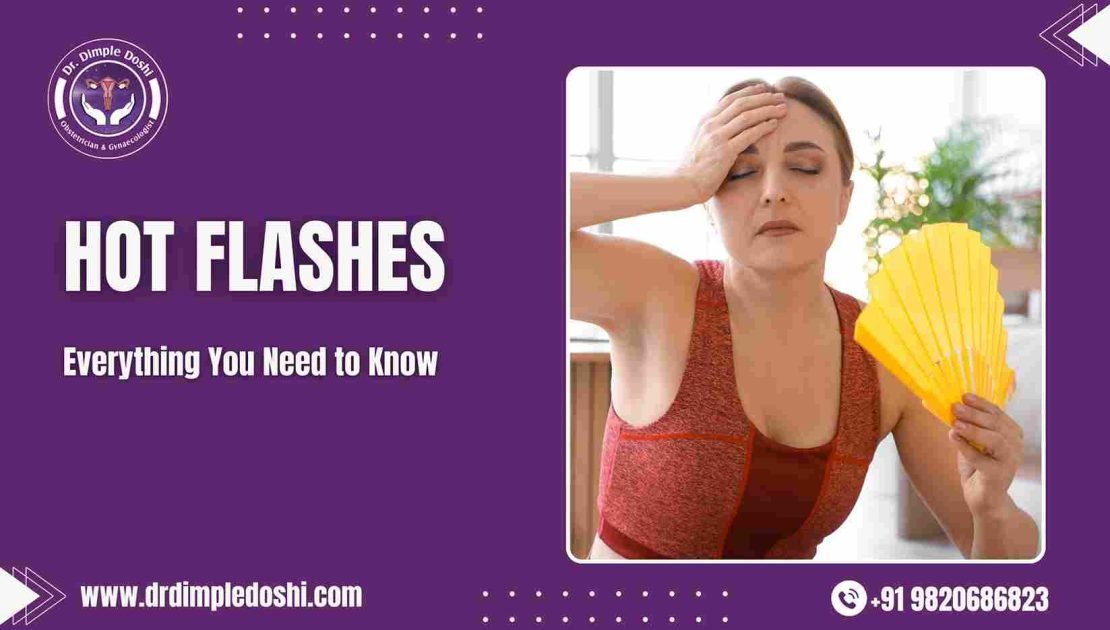Everything You Need to Know About Hot Flashes

Table of Contents
Hot flashes are one of the most common symptoms of menopause, characterized by sudden warmth that primarily affects the upper body. In this blog, we’ll explore what hot flashes are, their causes, symptoms, and various management options to help you find relief.
What Are Hot Flashes?
Hot flashes involve an intense and sudden feeling of warmth, typically affecting the neck, face, and chest. The skin may flush red, followed by sweating. In some cases, the body’s attempt to cool down can lead to chills. While hot flashes are most commonly associated with menopause, they can also occur due to other factors.
Interestingly, the term “hot flushes” is more commonly used in Canada, while “hot flashes” is preferred in the United States.
What Causes Hot Flashes?
Although the exact cause of hot flashes isn’t fully understood, falling estrogen levels and hormonal imbalances are common triggers. Other potential factors include:
- Spicy foods
- Excess sugar
- Hot beverages
- Alcohol
- Caffeine
- Smoking
- Warm environments
- Tight clothing
- Anxiety or stress
- Thyroid hormone imbalances
- Chemotherapy or radiation therapy
Common Symptoms of Hot Flashes
The intensity and frequency of hot flashes can vary. Common symptoms include:
- Sudden warmth in the neck, face, and chest
- Flushed or reddened skin
- Rapid heartbeat
- Sweating
- Anxiety or a sense of panic
- Cold sensations after the flash subsides
- Tingling in the fingers
How to Manage Hot Flashes
Managing hot flashes typically falls into three categories: lifestyle changes, prescription medications, and natural remedies.
1. Lifestyle Changes
Identifying triggers and making lifestyle adjustments can significantly reduce the frequency and severity of hot flashes. Consider the following tips:
- Dress in layers to regulate body temperature
- Drink cold water when you feel a hot flash starting
- Use a fan or keep the room cool, especially while sleeping
- Avoid spicy foods
- Limit alcohol and caffeinated beverages
- Quit smoking
- Reduce high-fat and high-sugar foods
- Practice stress-reducing activities like yoga or meditation
2. Prescription Medications
If lifestyle changes aren’t sufficient, a gynecologist may recommend medications, such as:
- Hormone replacement therapy (HRT). HRT can the risk of ovarian and breast cancer; heart diseases; stroke and other thrombotic events.
- Supplements with iso flavonoids and phytoestrogens; vitamins B6 and B12
Role of antidepressants; gabapentin and others may be best decided by your gynecologist as they are not regularly prescribed.
3. Natural Remedies
Natural remedies remain a topic of debate, as studies have shown mixed results. Popular options include:
- Black cohosh: A herbal supplement thought to reduce hot flash symptoms
- Dong Quai: A traditional Chinese medicine used for menopause relief
- Evening primrose oil: Often used to balance hormones
- Soy isoflavones: Plant compounds that mimic estrogen and may help reduce symptoms
Conclusion
Hot flashes are more troublesome in the initial postmenopausal phase; with time the severity and frequency goes down. However they may persist for many years with reduced intensity.
Hot flashes are a common part of menopause but can be managed with lifestyle adjustments, medications, or natural remedies. While they may not be entirely preventable, adopting proactive measures can improve your quality of life.
For more information or personalized advice on managing hot flashes, consult our gynaecologist dr dimple doshi ; at Vardaan Hospital today.
Frequently Asked Questions (FAQ’s)
If you’re over 40 and experiencing sudden waves of heat, sweating, flushing, and chills, it’s likely due to menopause. They often occur at night and last from 30 seconds to 10 minutes.
Wear light clothing, keep your room cool, avoid spicy foods, practice deep breathing, drink cold water, and try hormone therapy or natural supplements like black cohosh.
- Sudden Onset (random, unpredictable)
- Gradual Increase (worsen over time)
- Short-Term (last a few months)
- Long-Term (persist for years)
- Pre-menopause (normal cycles, no symptoms)
- Perimenopause (irregular cycles, hot flashes, mood swings)
- Menopause (12 months without a period)
- Early postmenopause (first few years after menopause)
- Late postmenopause (stable hormone levels, long-term effects)
They usually decline by age 55–60, but some women experience them into their 70s.
Anxiety, thyroid issues (hyperthyroidism), infection, low blood sugar, or medications (like antidepressants or steroids).
Black cohosh, soy isoflavones, flaxseeds, red clover, and evening primrose oil can help reduce symptoms. Staying hydrated and active also helps.
Hot flashes are the most common, but irregular periods, night sweats, mood swings, and vaginal dryness are also major symptoms.
Stress, caffeine, alcohol, spicy foods, tight clothing, heat, smoking, and hormonal changes can all trigger hot flashes.
